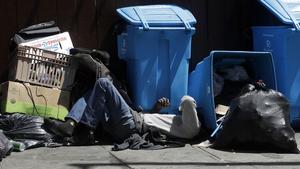Unhoused people aged 65 or older to more than double by 2030, study finds
 A homeless man sleeps on the street in San Francisco, California. (PHOTO / AP)
A homeless man sleeps on the street in San Francisco, California. (PHOTO / AP)
A growing number of US citizens aged 55 and older are homeless and are having to rely on handouts to survive, advocates say, as they become the fastest-growing group of unhoused people in the country, according to studies and federal data.
Several homeless shelters across the country report an increase in the number of elderly people turning up for help.
At least 250,000 seniors were homeless at some point in 2019, said the United States Department of Housing and Urban Development.
Lisa Glow, CEO of Central Arizona Shelter Services, the largest homeless center in the state, said: "The numbers (of homeless baby boomers) are increasing. In fact, the Maricopa Association of Governments (in Arizona) does a quarterly trends report, and there was a 31 percent increase in the 62-plus homeless population from March 2022 to March 2023. Our data showed a 43 percent rise in service to the 55-plus population in 2022 from the prior year."
There are at least 72 million baby boomers in the US. Born between 1946 and 1964 after World War II, the youngest are around 59 years old this year. This generation made up 16.5 percent of the US' homeless population of 1.45 million in 2019, The Washington Post reported.
While boomers own the largest amount of real estate in the US at 44 percent, not all are secure. Many have faced unique hardships such as the recessions of the 1970s and 1980s, which caused widespread financial difficulties.
Others who rent must cope with rising housing costs and are at risk of eviction. The youngest boomers have no access to Social Security benefits until 62.
The trend of homelessness among older people is stark in New York; San Francisco; Anchorage, Alaska; Portland, Oregon; and other places. All those cities have high rents and often favor younger renters.
Maureen Fleming, 67, a choreographer and performance artist who has been awarded a Guggenheim Fellowship and four Fulbright awards, lived in her 1,200 square feet (111 square meters) loft in Manhattan for 40 years with her husband Christopher Obo, 68, a Broadway artist.
Her rent went from $450 in 1981 to $1,675 recently after a company bought the property from a private owner. She was offered a new lease but could not afford it and was forced out of her home last year. She found a place to stay and was thankful not to be homeless.
" (Leaving) was the hardest, most horrendous thing that we've been through," Fleming said.
The number of homeless elderly people will triple over the next 10 years, said a 2019 study by Dennis Culhane, a professor and social science researcher at the University of Pennsylvania. He looked at three cities: Boston, New York and Los Angeles.
"The national population of people (aged) 65 or older experiencing homelessness is estimated to grow from 40,000 today to 106,000 by 2030," the study said.
"The projected upturn of the aging homeless population — concentrated among those born between 1955 to 1966 — will also lead to a surge in cost increases associated with healthcare and shelter needs."
Healthcare needs
Homeless seniors have specific healthcare needs that must be addressed, Glow said.
"They have chronic health needs, declining mental health, and so many are on fixed incomes," she said. "There is a severe lack of housing for them, and we must turn this around to address the silver tsunami of the homeless."
The National Health Care for the Homeless Council estimates there are 150 short-term respite centers nationwide; there were just 80 in 2016. They help homeless people recuperate for a few weeks after they are in a hospital or have had health issues. Many stay longer.
Jeff Smith, senior manager of communications at North Texas Food Bank, said: "Nearly 700,000 North Texans are unsure of where their next meal will come from. With inflated food, gas and housing costs, our neighbors in every ZIP code are facing increasingly difficult choices every day."
Agencies contributed to this story.
belindarobinson@chinadailyusa.com


